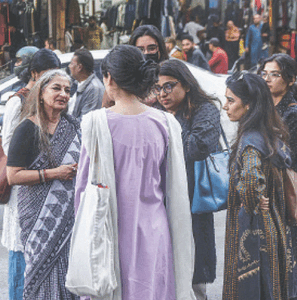KARACHI: The transcendental quality of folk and Sufi music was the subject of a debate at the Irtiqa Institute of Social Sciences on Saturday which saw producer, writer, singer and musician Bedil Masroor as the guest speaker.
He commented on the history of Sufi music and its relationship with religion and society, in the times past and also in a more contemporary setting. The intimate audience comprised literary figures, academics, writers, poets, intellectuals and activists.
Charting the history of languages, especially before the development of a civilised society, and referencing the Stone Age in particular, Bedil spoke about how voices and rhythms had been used as a medium of communication among humans since the start. And those sounds evolved over time to not just serve a very basic purpose, but used more so in the pursuit of pleasure. Singing, dancing, or in this particular context, folk music has employed similar variations in rhythm to convey feeling, meaning and forge connections among people, and with God.
Folk music, according to Bedil, has always belonged to the people. “Folk music has been transferred from the common man’s hut to the palaces. This transition and transmission allowed the music to transform and become more innovative, and these influences have made it what it is today,” he said. However, he lamented, that credit was not shared with the faqirs, who were the nucleus of that lok virsa. Many, especially those belonging to the gharanas, were possessive about their musical knowledge and did not share credit, nor did they allow that knowledge to spread to a larger audience.
Bedil was an entertaining speaker, though the talk did become tedious due to its academic tangent. He peppered his talk with singing out various dhuns, taranas, ragas, rhythms and beats. For him to explain successfully how the suroor had changed over time, it was essential to hum and sing them out to the audience. He also shared instances of how folk music picked up on Sufi elements to evolve over time.
Islam and its stance on music was also touched upon at the talk with various interpretations regarding its legitimacy. “Raag is like the sun, warm and bright, shining on each and every one. What varies is how those in its wake absorb its powers.” Ragas could bring contentment to some, induce peace and harmony in others, while some might be negatively influenced by them, he said. “Some may connect you to God, while others may take you away from Him,” he said. Which was why the debate concerning whether music was allowed in Islam would always exist, he added.
Going back to the history of the subcontinent, Bedil spoke about how Emperor Akbar’s court had a famous addition known as Mian Tansen, a prominent composer and singer. Tansen’s compositions are legendary, so much so that the ragas he composed during his time at court are still in use today. Bedil spoke at length how much of what Tansen composed had not been documented and folk music in Pakistan suffered from a similar issue. “Sindhi lok sangeet is not being documented, written, compiled and distributed as it should. Therefore, this tradition suffers greatly,” he said. Bedil has proposed a formula that breaks it down and though this has garnered a lot of criticism from his peers and seniors, he stands by it.
The strong oral tradition of Sindhi folk music has allowed it to survive to date, however, with its importance dwindling in an age of more visual imagery, these traditions are threatened and unless action is taken in saving them, they may well be lost.
Published in Dawn, April 12th, 2015
On a mobile phone? Get the Dawn Mobile App: Apple Store | Google Play

































